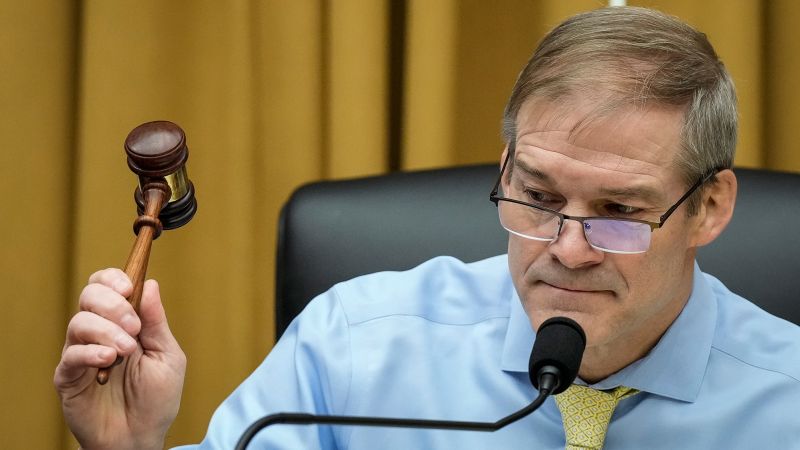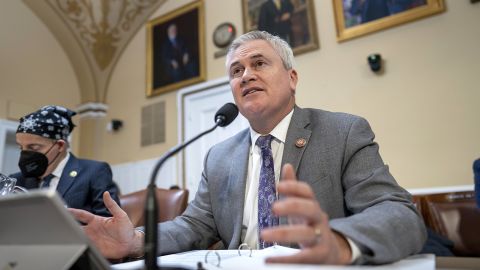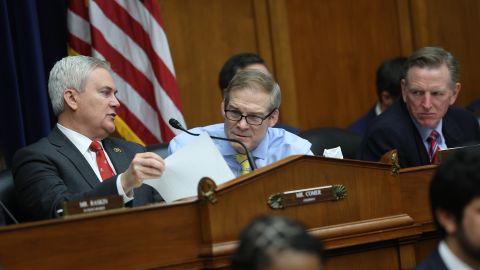
Washington
CNN
—
Rep. Jim Jordan, one of the GOP’s most vocal partisans and now the chair of the powerful Judiciary Committee, started a recent meeting on the “weaponization” of the federal government with a surprising move: He urged caution.
Rather than issuing a series of partisan attack lines about the so-called “Deep State,” Jordan took a low-key approach – handing out binders of reading materials and cautioning members to be meticulous about who they haul in for interviews, a source familiar with the meeting told CNN.
“We’re going to try to get all the facts on the table for the American people, because that’s always the first step,” Jordan told CNN after the Jan. 27 meeting.
Jordan allies have gone out of their way in recent weeks to claim the usually hyper-partisan attack dog wants to take a more methodical approach in turning up the heat on his primary target – the Biden Justice Department. The Ohio Republican, they said, believes amassing more evidence before mounting public pressure could help him squeeze more from DOJ and boost his credibility in the long run.
“It’s important to be methodical,” Rep. Elise Stefanik of New York, chairwoman of the House Republican conference and a member of the so-called weaponization subcommittee told CNN. “Jim knows the different levers to use.”
But around Washington, skepticism abounds over whether a longtime Trump loyalist, partisan firebrand and staunch election denier can transform into a serious committee chair – let alone someone capable of heading a bipartisan investigation.
“Better late than never!” Democratic Rep. Gerry Connolly, a newly-appointed member of the weaponization subcommittee, told CNN of Jordan’s attempted rebrand. But Connolly, and other Democrats who spoke to CNN for this story, made clear they weren’t holding their breath.
“If he wants to turn a new leaf and be credible and methodical and try to get at the facts as opposed to wacko conspiracy theories and the latest news item propagated by right wing media – which he haunts I might add – that would be welcome,” Connolly said before adding sarcastically, “I’m just shaking in anticipation to see it!”
On its face, Jordan’s weaponization subcommittee presumes that for years the federal government has worked to thwart conservatives, a premise that already strains credulity among Democrats, many of whom are still fuming that Jordan stonewalled the subpoena for his testimony last year from the House select committee that investigated the January 6, 2021, attack on the US Capitol.
“If he was serious he would have honored the subpoena that was sent to him last Congress for January 6,” said Eric Swalwell, a California Democrat and Judiciary committee member. “So, I think he starts this Congress with zero credibility and has to prove otherwise.”
Membership of the weaponization subcommittee solidified this week, with Democrats naming nine members to go along with 12 Republicans, including Jordan as chair. Among the Democrats are some younger members with backgrounds as prosecutors, including at least one involved in Donald Trump’s first impeachment trial, a sign some interpret as Democrats girding for deeply partisan battles to come.
Still, skeptics have noted some small signs that Jordan is attempting to be more bipartisan.
When organizing the Judiciary committee for the first time, Jordan announced Wednesday that he had worked out a deal with the panel’s top Democrat, Rep. Jerry Nadler, to allow Democrats a 24-hour heads-up before issuing a subpoena.
Though Republicans on Judiciary and the weaponization subcommittee will still be able to unilaterally issue subpoenas, the announcement is a noted departure from Jordan’s initial plan to keep Democrats entirely in the dark on subpoenas – a concession Nadler said he hopes is a sign the Republican majority will work with Democrats in good faith as the panel embarks on various investigations of the Biden administration.
On Thursday, Jordan announced the subpanel’s first hearing will be next week, but did not disclose the topic or the witnesses.

Jordan’s take-it-slow approach with DOJ appeared to be on display this week as the Judiciary committee officially kicked off its work. Jordan focused his fire on securing the southern border, the topic of the committee’s first public hearing. He stayed out of the fray when members on the panel fought over the prospect of saying the pledge of allegiance at every meeting. And he stayed mum on the interview happening just one floor up, where committee staff were grilling a former FBI official behind closed doors as part of Jordan’s efforts to probe alleged political bias at the FBI.
Jordan has also for the most part deferred to his colleague House Oversight Chairman James Comer in pressing two of the sharpest attack lines against the president – the special counsel investigating Biden’s retention of classified documents, and issues surrounding his son Hunter Biden, who is under criminal investigation for tax fraud.
In recent weeks Comer has made a flurry of document and interview requests, burying the National Archives, the White House and the Penn Biden Center. Comer has also embraced the narrative that the classified documents case ties directly to Hunter Biden.
“We’re looking at it on Oversight from a Biden family influence peddling deal and from the angle that we have legislative restriction over the National Archives” Comer told CNN.
According to Jordan’s allies, it’s better for Comer to own those issues, than it is for Jordan.
“We’re not sad that it’s somebody else’s thing” one source told CNN of Comer’s investigation into Hunter Biden. “By not doing that, it sort of preserves some legitimacy.”
Comer’s barrage of document requests has been accompanied by regular cable news hits from Fox to NBC and CNN as he steps into the right-wing limelight leading the Oversight panel.
If Jordan has waded cautiously into the Biden document drama, Comer dove in headfirst.
“It’s the reverse process for Comer, who is seen by those guys as very much, a kind of ‘good old boy’ McConnell-style politician,” a Democratic lawmaker added, nodding to Comer’s attempt to elevate his MAGA profile.
A GOP source familiar with Jordan’s strategy said, “Chairman Jordan has been strategic about the classified documents issue and has expressed to his colleagues there needs to be a careful and methodical way to conduct oversight. He has years of experience conducting congressional investigations and he has found this to be the best path forward.”
An early test will be what if any information Jordan extracts from the Justice Department about the Biden special counsel.
Jordan told CNN last week he would consider a subpoena if the DOJ doesn’t give his committee what they’re demanding. Jordan’s aides have said he’s bracing for a long and brutal fight, part of the reason he’s trying to be more thoughtful in his approach.

“We’ll issue the subpoenas and try to get the information and documents that we need,” Jordan said, adding that he expects resistance from DOJ and the FBI. “If they give us the runaround, they give us the runaround.”
DOJ responded on Monday to Jordan’s requests, telling him that it will not provide most of the information he requested about the ongoing special counsel investigation into Biden’s handling of classified material until that probe is complete.
Privately, Republican lawmakers acknowledge there’s little they can to do force the Justice Department’s compliance, acknowledging the limitations of working with a special counsel.
“We push, they resist, we figure out how to push harder and they figure out how to resist and then we see who wins,” GOP Rep. Chip Roy, who serves on Judiciary and the new subcommittee said of the battle ahead with DOJ.
Democrats are waiting to see how Jordan handles the inevitable pushback from DOJ.
“Jim Jordan knew all along that he wasn’t entitled to disrupt ongoing criminal investigations,” a Democratic aide familiar with the investigation told CNN. “The question is whether he will clutch his pearls and pretend to be outraged, or actually sit down and work with a Department that seems willing to give him at least some of the information he has requested,” the aide said.
Said Nadler, “I don’t know if there’s a strategy,”
The White House doesn’t seem to be buying Jordan’s change. A Biden administration official told CNN, “Jordan is launching a special committee to try to obstruct justice and interfere in law enforcement investigations,” and added that Jordan’s “credibility is in serious question, as he tries to weaponize his perch to attack his own political enemies.
Rep. Mike Johnson, vice chair of the Republican Conference Committee, framed Jordan’s actions in terms of the long game he is playing.
“There’ll be a time for aggression, but this is not a political exercise to us,” said Johnson. “This is not about political retribution. We’ll be accused of all that, but this is a fact finding mission for us.”
“It’s not fire, ready, aim,” Rep. Richard Hudson, a North Carolina Republican, said of why Jordan is waiting to issue subpoenas on classified documents. “You want to very carefully gather your facts, where they lead. See where subpoenas may or may not be necessary. I think you’ll see a very serious, methodical approach to this and that’s why it will be successful.”

Once a thorn in the side of party leadership, known for his ultra-partisan rhetoric during the investigation into the Benghazi attacks and both impeachments of Trump, Jordan is now a key ally to House Speaker Kevin McCarthy and leads one of the most powerful congressional committees.
Jordan has long been a regular fixture on Fox News. But for the first time since 2019, Jordan appeared on NBC’s flagship “Meet the Press” show on Sunday morning.
“Jordan is obviously firmly anchored in that Freedom Caucus right-wing MAGA world. He’s a close Trump confidant,” said one Democratic lawmaker. “His effort, if he wants to do this, will be to try to create more credibility, especially outside of Fox News.”
Jordan has told CNN he wants to focus on what he believes are the “different levels of treatment” that Biden and Trump received from the DOJ and FBI when the existence of classified documents emerged.
“The Attorney General says the rules are the same for everyone. While the rules may be the same, but the application sure seems different. And that’s what we’re going to look at,” Jordan said.
Oversight panel member GOP Rep. Tim Burchett of Tennessee told CNN that Jordan and Comer will need to draw clear lines and capitalize on the public pressure of the moment to address the classified documents issue.
“They have a limited window of opportunity because just publicly the interest will drop, and you know we’ll just be meeting over having meetings and nothing gets resolved. I don’t think that’s what they want,” Burchett said.
But he added, “I hope that when all of the politics of it subsides that we can come up with some clear policies. I see this as an opportunity for some real bipartisan work.”
